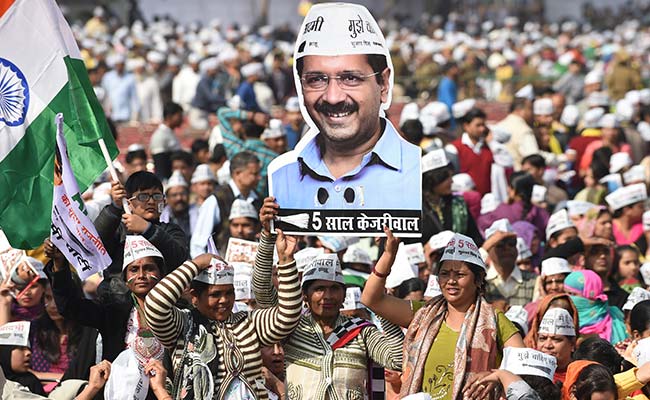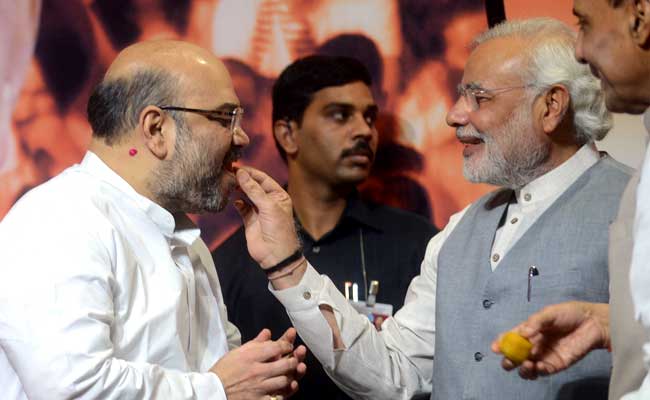No doubt Kejriwal remains sincere in his commitment to deliver justice to the people but his party has degenerated too much too soon to execute that lofty ideal. However, the Delhi Chief Minister and his close circle of friends and advisers failed to see the writing on the wall. In an essay titled "Dizzy with Success", Stalin had warned his comrades not to get deflected from their chosen path merely because the Communist Party Government in the erstwhile Soviet Union appeared to be fulfilling targets ahead of time. It is easy to become dizzy with success but that leads people to lose connect with the ground, Stalin had warned, adding that it was necessary to know whether the masses were really happy with what the Government had achieved or if they would have preferred something else.
Aam Aadmi Party was swept into power in the Delhi Assembly in 2015 at the crest of a gigantic wave of public support. It was almost incredible that the party could win 67 of the Delhi Assembly's 70 seats so soon after Narendra Modi routed all Opposition to lead the NDA into a magnificent victory garnering absolute majority in the Lok Sabha. The BJP which won all seven Lok Sabha seats was reduced to a pathetic tally of three in the Assembly. That is what caused the dizziness with success - a spell that has finally been broken by yet another Modi wave in the MCD polls that reduced AAP to 48 seats against BJP's 181 in the municipalities.

Chief Minister Arvind Kejriwal's Aam Aadmi Party had swept assembly elections in Delhi two years ago
So why did AAP lose and that too so badly barely three years after it assumed power in Delhi? After all it was felt that having been in control of all three municipal corporations for 10 years at a stretch, BJP would face serious anti-incumbency which would naturally benefit AAP since the only other Opposition party, the Congress, was floundering leaderless all over the country.
No matter how hard Kejriwal tried and howsoever sincere his delivery, there was one over-riding factor he could not combat. And that factor is the immense popularity and credibility of Prime Minister Narendra Modi, supported by the strategic genius of BJP president Amit Shah. On their part AAP strategists could not have imagined a masterstroke like denying party nominations to ALL sitting councilors. No party had done this before. Normally dropping even one sitting legislator leads to a near-revolt and defeat stares at the party's face. But convinced that Modi's charisma and firm control over the party will carry the day, BJP experimented. As a result, in one stroke anti-incumbency was deflected from the party to individual, outgoing councilors.
Kejriwal in 2015 had the huge advantage of youthful volunteers thronging makeshift AAP offices, wearing T-shirts and jeans, eagerly canvassing for a New Dawn that the former Income Tax officer had promised the faithful. This time there was not one such campaigner visible. The "revolution" had spent itself and Kejriwal had nothing new to inspire the middle class youth.

The BJP won 181 of the 272 wards in the three corporations, while AAP could only win 48
Although a few busloads of NRIs descended from flights from the US and UK to campaign for the party in Punjab, they were nothing compared to the large number of idealistic young enthusiasts who had volunteered for AAP in the Delhi Assembly polls.
In all fairness, Kejriwal could not have done much to stem his party's slide in Delhi. Arguably, former Lt.Governor Najeeb Jung's combative ways and the transparently bellicose relations between the Union Government and the Kejriwal regime too handicapped the Chief Minister to some extent. But then, was it necessary for Kejriwal to declare a virtual war against Narendra Modi? The conventional explanation that he was seeking to avenge his defeat at Modi's hands for the Varanasi Lok Sabha election, did no good to the AAP leader's image. Most Dilliwalas felt that their CM should have focused on the Capital instead of opening so many fronts outside.
But most importantly, it is the disillusionment with the inability to bring about systemic change, effectively control corruption and failure to address Delhi's myriad development aspirations that found expression in the quiet outburst against the Aam Aadmi Party. This often happens to highly idealistic political outfits that fail to maintain the momentum of idealism especially among its own cadre. Indian politics has a way of "normalizing" those who enter from non-political backgrounds like Kejriwal.
But is all lost for him? It is rightly said there are no full stops in Indian politics. But to rise phoenix-like Kejriwal will have to become a normal politician and give up trying to script a holier-than-thou political roadmap.
(Dr. Chandan Mitra is a journalist, currently Editor of The Pioneer Group of Publications. He is also former BJP MP, Rajya Sabha.)
Disclaimer: The opinions expressed within this article are the personal opinions of the author. The facts and opinions appearing in the article do not reflect the views of NDTV and NDTV does not assume any responsibility or liability for the same.


